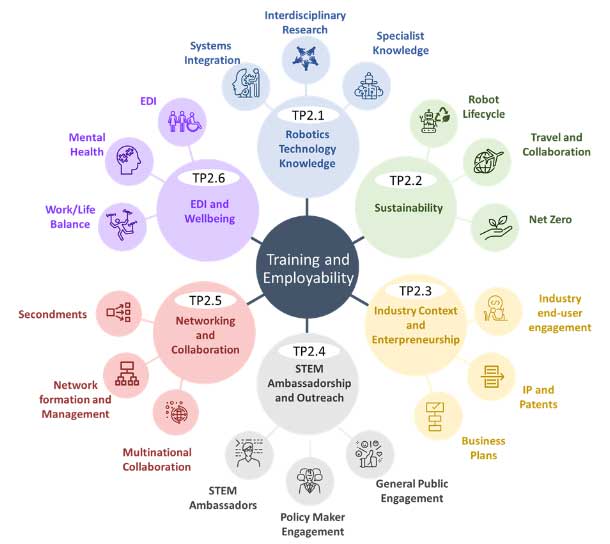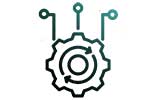Training principles
The RAINZ CDT training programme is guided by three core training principles that shape the development of its researchers.

Training principle 1: Collaboration
RAINZ students are trained together as a collaborative cohort through a hybrid work research ecosystem.
The geographic spread of the students means that it could be easy to become isolated or only engage with the other local students, however in the post-pandemic world, hybrid working across sites and countries is now standard.
At the core of this training principle will be the development of supportive communities, both technical and welfare. All students will be required to meet virtually each week as a cohort to provide brief technical updates as well as share experiences and opportunities.

Training principle 2: Skills for the future
All training activities are structured around six topics, identified by academic and industrial partners as essential for future robotics leaders. These topics are summarised in the image (Figure 1) and bullet points below, illustrating the comprehensive scope of the training activities that support the development of well-rounded, future-focused robotics professionals.

The structured six topics are summarised as follows:
- Robotics Technology Knowledge:
- Systems integration
- Interdisciplinary research
- Specialist knowledge.
- Sustainability:
- Robot lifecycle
- Travel and collaboration
- Net zero.
- Industry Context and Entrepreneurship:
- Industry end-user engagement
- IP and patents
- Business plans.
- STEM Ambassadorship and Outreach:
- STEM ambassadors
- Policy maker engagement
- General public engagement.
- Networking and Collaboration:
- Secondments
- Network formation and management
- Multinational collaboration.
- EDI and Wellbeing:
- Equality, diversity and inclusion
- Mental health
- Work/life balance.

Training Principle 3: Ethics
Responsible innovation and ethics (RI&E) will be part of the CDT’s core, both at the CDT level and student project level. Taught coursework in RI&E will precede research to prepare PhD candidates to consider wider societal implications of their projects. All student projects will incorporate the EPSRC’s AREA (anticipate, reflect, engage, act) into their research plans.
